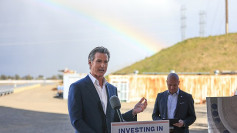The U.S. Securities and Exchange Commission announced Tuesday that it will not defend its climate disclosure rule in court, marking a major policy reversal amid growing opposition from business groups and Republican lawmakers. The rule, finalized in March 2024, required publicly traded companies to disclose climate-related risks and, in some cases, their carbon emissions, but faced intense legal challenges from industry groups and Republican state attorneys general.
Acting SEC Chair Mark Uyeda, a Republican, justified the decision in a statement: "The rule is deeply flawed and could inflict significant harm on the capital markets and our economy." Uyeda has ordered SEC lawyers to request a delay in oral arguments over the rule, which is currently under review by a federal appeals court in St. Louis following lawsuits from the U.S. Chamber of Commerce and other business organizations.
The move comes amid a broader effort by the Trump administration to unwind Biden-era environmental and energy regulations. The SEC joins the Transportation Department, which last week announced it would suspend a $5 billion electric vehicle charging program, and the Interior Department, which has been rolling back climate-related initiatives.
Political and Industry Reactions
The SEC's decision was welcomed by Republican lawmakers and business leaders, who argued that the rule would have placed undue regulatory burdens on companies, particularly in sectors like agriculture and energy.
Sen. Mike Rounds (R-S.D.), a member of the Senate Banking Committee, applauded the move, writing on social media: "The SEC's overreaching climate rule would have burdened farmers, ranchers, and small businesses with costly reporting requirements and red tape. I'm glad to see it revoked today."
Industry groups have long opposed the disclosure requirements, arguing that existing securities laws already mandate companies to provide material information to investors, including financial risks associated with environmental changes. Critics also contended that the rule's emissions reporting mandates would be costly and complex, particularly for companies reliant on global supply chains.
SEC Division Over Climate Policy
The decision to abandon the rule sparked sharp criticism from SEC Commissioner Caroline Crenshaw, a Democrat, who accused Uyeda of using procedural maneuvers to achieve a policy-driven rollback.
"By abandoning this appeal, the acting chair is attempting an end-run around Commission authority to align with his policy preferences," Crenshaw said.
The SEC's climate rule was initially passed by a 3-2 vote in March 2024, when Democrats held a majority under former SEC Chair Gary Gensler. The regulation required companies to disclose climate-related risks that could impact investors' decision-making, including details on direct carbon emissions when deemed financially relevant.
However, the final version of the rule was already weakened compared to its original 2022 proposal. The SEC had initially considered requiring mandatory disclosure of indirect supply chain emissions-a provision strongly opposed by the oil and gas industry. The final version scaled back these requirements and removed mandates on disclosing emissions from products sold.
The current SEC leadership now has a Republican majority, with Uyeda serving as acting chair until the Trump administration appoints a permanent replacement. Once Trump nominee Paul Atkins is confirmed as the new SEC chair, the regulator is expected to have three Republican commissioners and two Democratic commissioners.
Legal and Market Implications
The SEC's decision to abandon the rule leaves legal uncertainty over whether climate-related disclosures will be required at all. With the case now in limbo, investors seeking standardized climate risk data may face a patchwork of voluntary disclosures rather than a uniform federal framework.
Clara Vondrich, a lawyer for the nonprofit Public Citizen, condemned the SEC's decision, stating: "Delaying the climate appeal demonstrates a fundamental disregard for retail investors who need clear and consistent financial risk disclosures so they can invest their hard-earned savings wisely."
Meanwhile, some institutional investors, including pension funds and environmentally focused asset managers, have argued that climate-related disclosures are essential for assessing long-term financial risks. Wildfires, hurricanes, and supply chain disruptions caused by extreme weather events have raised concerns about how companies factor climate risks into their financial planning.
Beyond climate policy, the SEC under Uyeda has already moved to scale back enforcement actions. The regulator has limited its staff's ability to issue subpoenas, a move expected to slow financial investigations. Additionally, Uyeda has placed Republican SEC Commissioner Hester Peirce, a strong advocate for cryptocurrency, in charge of a task force working with the crypto industry.






